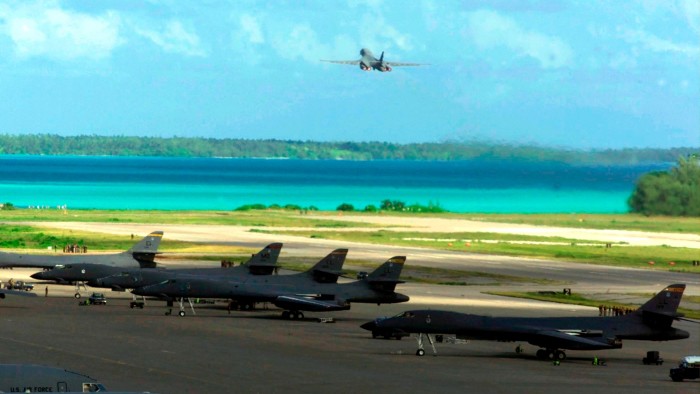Unlock the Editor’s Digest for free
Roula Khalaf, Editor of the FT, selects her favourite stories in this weekly newsletter.
Sir Keir Starmer has signed a long-term deal to hand sovereignty of the Chagos Islands to Mauritius that will see Britain pay more than £100mn a year to guarantee the future of a joint US-UK air base.
The government said the deal would guarantee the future of the Diego Garcia air base in the Indian Ocean for “at least the next century” and that the net present value under the treaty was £3.4bn.
The prime minister signed the deal with the Mauritian government only after a last-minute High Court injunction granted in the early hours of Thursday halted the virtual ceremony.
Mr Justice Martin Chamberlain said on Thursday that an emergency order granted at 2.25am “is discharged from this point onwards”.
Starmer said the base was “absolutely vital” for national security and played a role in military operations in the Red Sea and across the Indo-Pacific.
In his ruling Chamberlain said the application for an injunction was “unprecedented” and would prevent the government from concluding a treaty “in the exercise of a foreign treaty prerogative” to which it was entitled.
Chamberlain’s ruling came after Mr Justice Julian Goose granted a stay of the deal in the early hours of Thursday in a case brought by two Chagossian women — led by Bertrice Pompe — against the UK Foreign, Commonwealth & Development Office.
The deal will see the UK pay £101mn a year and includes what ministers called “robust provisions to keep adversaries out” of the Chagos area, including a 24-mile nautical buffer zone and a ban on foreign security forces on outer islands.
The measures, widely seen as being aimed at China, also include a process with Mauritius to “prevent any activities on the wider islands” from disrupting base operations.
The long-planned arrangement for the British Indian Ocean Territory has been heavily criticised by the opposition Conservative party, which has accused Starmer of giving up an important strategic asset and saddling taxpayers with large payments to retain access.
US criticism of the arrangement has been muted under President Donald Trump.
At a hearing in the case on Thursday morning, Philip Rule KC, acting for the lead claimant and speaking remotely from New York, petitioned the court to extend the “interim relief” on the deal. He argued that the government had not given proper “recognition and consideration and provision” for Chagossian UK citizens in its decision-making.
However, Chamberlain was critical of the overnight application from the start of the hearing, stating that it was “not really a proper way to litigate” and that the lead claimant should have made an application sooner.
The “interim relief” application was made after the claimants had signalled to the UK government in March that they intended to bring a claim but had struggled to obtain the necessary funding ahead of the government’s decision to sign the treaty, delaying the case.
The Mauritian government did not immediately respond to a request for comment about Chamberlain’s ruling. Before it, one government official said ministers wanted the deal to proceed.
James Eadie KC, acting for the UK government, told the court that the claimant was seeking something “unheard of in legal history” by preventing the government from signing a treaty, and that there were “enormous concerns about risking the orderly conclusion of months of negotiation”, which also threatened the UK’s national security arrangements with the US.
The signing of the deal had been delayed until further notice on Thursday following the late-night application. A press conference with UK defence secretary John Healey was abruptly cancelled in the early hours.
Additional reporting by David Pilling in London



